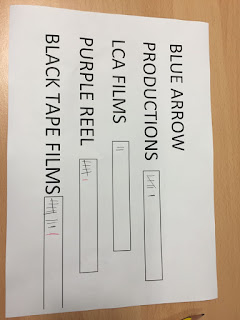My partner and I decided on names for our production. 'Blue Arrow' and 'Purple Reel' were the two production names, and 'LCA Films' and 'Black Tape Films' were two names that we decided on for our ident. From this, we decided to ask our targeted audience which name they thought was best. From the vote, you can see that the decided production company name was 'Blue Arrow' and our ident name was 'Black Tape Films'.
Monday, 7 November 2016
Sunday, 6 November 2016
Harry Potter - Film scored Analysis
This is one of the most famous pieces of score music, from the series 'Harry Potter'. This soundtrack is from 'Harry Potter and the Philosophers Stone' known as 'Hedwig's Theme'. The soundtrack was composed by John Williams who scored the first three Harry Potter films. This soundtrack was featured in the prologue, until it was then used in the end credits.
This piece of music is well known for its pacy, rhythmic and magical sounding tune. Originally the score was created for Harry's pet snowy owl, named Hedwig. However the use of the scored music throughout the film captures the mystery of what the character, Harry would have felt like finding out that he belonged to a world full of magic, wizards and witches.
The film score is played mainly in an E minor key. Williams plays this tune in 6 bars, had there been a seventh the music would have been in the realm of the ordinary. Therefore, by substituting the F# with F, and the A with A#, Williams is able to create a chord which cannot be completely explained, just like a wizard's magic.
Although this scored music may not be present in the entire Harry Potter squeal there are a few that contain this music in either their trailer, throughout the film or during the end credits, for example: The Philosopher Stone, The Chamber of Secrets and The Goblet of Fire. These are just a few of the films in the sequel.
For our film trailer we have had to find a piece of music that has already been created, as we have neither the time nor the equipment to create our own. Although this saves us time, some time will obviously be spent researching and listening to different music to ensure that our chosen soundtrack fits well with our chosen genre and also, enhances the action on screen. Our soundtrack choice will be similar to this film score, a piece of music that is upbeat and engaging to an audience.
Friday, 4 November 2016
The History/Elements of Film Scores
The History of music in Films:
Before the 30's all film productions were silent. As the
years progressed music was then added to films to make them more interesting
and to heighten the experience for the audience who were engaging within the
media product.
During the 50's when Jazz music was introduced the music
score that was placed in films had changed. Because of this it was less
expensive for musicians as an entire orchestra was no longer needed. This
continued through to the 60's.
Current score writers such as John Williams still use these
techniques.
Within the 80's and 90's it became possible for the first
time for a single composer to produce an entire scored piece of music because
they used a synthesizer to produce the many sounds of the instruments.
With todays technology, we are able to create film scores
that contribute to the movies plot to enhance the film and make it more
engaging. Additionally, the film scores that are added to different media
products convey different emotions for the audience and enhance the genre, e.g,
satirical, horror or fantasy.
Elements of Film Score:
TEMP TRACKS - A temp track is a film score which already exists and is
used during film production during editing it acts as guidance for the mood or
atmosphere.
Film score composers are sometimes asked to imitate a
specific composer or style in their temp track. Some directors prefer temp
scores so much that they decided to use the temp score instead and reject the
original score written by the film composers.
STRUCTURE - Films have different themes depending on the type of
character they are, the event or even the story line. Therefore the way the
music is played varies, for example, scattered amongst identical music.
SCORE MUSIC - A majority of films have around 40 to 120 minutes of music
in their production. However, some films have little or no music within their
film, or others may have music running throughout.
Subscribe to:
Comments (Atom)
-
Here are some ideas that we have come up with for our final plot. We will end up choosing one of these ideas, to which we will then expand ...
-
Together, we have created two production logos to use for the start of our trailer. The names of the companies were chosen by students in ou...



